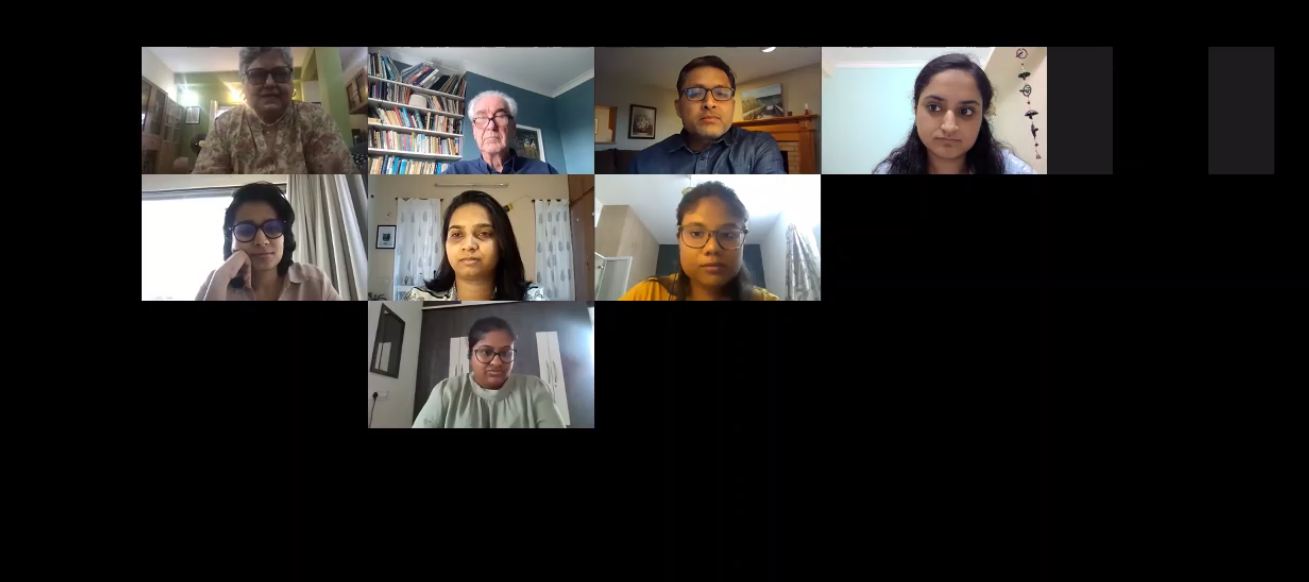Let whoever can do so deceive me, he will never bring it about that I am nothing, so long as I continue to think I am something.
– Descartes
What is mind? A single question has driven centuries of research in many mind and brain sciences. We have come a long way from Buddha, Aristotle, or Descartes to many modern philosophers and scientists whose answers have contributed to our current understanding of the mind. Building on those answers, Mind is Just the Brain, says Prof. David Papineau, Professor of Philosophy of Mind at King’s College London, in his address for The CogTalk organized by the Centre for Neural and Cognitive Sciences, University of Hyderabad on 25th March 2022. Prof. Papineau, a hard-core physicalist, is a luminary scholar of causation, mental representation, and consciousness. Having studied philosophy of science as well as consciousness, he brings to table an enthralling discussion on the physicalists’ stance on the mind.
Are we granting the mind its mystery or are we happy narrowing it down to the brain and the physical, thereby eliminating any philosophical mind-bogglers? Philosophers from the early days have focused on two positions primarily – monism and dualism of mind. When we wish to understand mind, Prof Papineau argues for physicalism, in identity with materialism (a monist position) against their dualist counterparts – epiphenomenalism (mental states add onto the physical states and don’t have causal powers themselves), overdeterminationism (a physical effect is brought about by both mental as well as physical causes), and interactionism (a physical effect brought about by a mental cause which is the effect of another physical cause).
His argument is straightforward; he presents three premises all of which if one accepts, one is bound to accept physicalism (the thesis that all mental phenomena are ultimately physical phenomena). Prof. Papineau supports his claim by stating that the dualist’s way of framing the question brings about the need to explain how A (physical states) ‘gives rise to’ B (mental states). Physicalists either reject this position by saying that there are no two different things for them to lead to one another, or declare it solved by stating that A ‘is’ B. When it comes to consciousness, the better question to ask would then be what are conscious states and a physicalist’s answer would simply be that conscious states are brain processes. But, does that actually solve the problem or does it just simplify the problem.
Currently, the emerging approach to understanding the mind is quantum physics. Scholars like Eugene Weigner propelled the idea of a quantum mind. Prof. Bindu Bambah, Professor of Physics, at University of Hyderabad pitches in the standpoint of Roger Penrose – a mathematician, philosopher of science, and a Nobel Laureate in physics, from his book, The Emperor’s New Mind. Penrose claims that there is more to consciousness than can be explained by Quantum physics or any modern physics. She probes for Prof. Papineau’s opinion of Penrose’s argument that quantum mechanics has an uncertainty to it which contributes to its inability to explain consciousness fully. Implying that it is highly not possible to build a conscious computer, or attribute agency to an AI system. Prof. Papineau however disagrees with this position and attributes certain vagueness to Penrose’s claim as to what AI systems cannot explain. He says that it is alright to believe that something about consciousness causes quantum collapse, but that cannot be an argument for conscious mind controlling the physical world.
An argument against physicalism is the Zombie problem, conceived by Robert Kirk and Keith Campbell and popularized by David Chalmers. To clarify, the idea of a zombie –a hypothetical being that is identical to humans except that it is devoid of consciousness and the experientiality of cognition– is not a problem for physicalism in itself but its conceivability is. Prof. Papineau tackles not just the zombie hypothesis but also Mary’s knowledge argument and the phantom limb phenomenon raised by the audience, with his physicalist position. When it comes to such thought experiments, he is of the opinion that they are crucial in establishing a priori assumptions of theories be it in science or philosophy. But one needs to be careful when it comes to intuitions, for they can be right or wrong and cannot be weighted much when theorizing.
Leading the discussion forward, Prof Mishra asks, do we now have what it takes to answer the question of mind or is there a need for a scientific revolution as Thomas Nagel puts it? If there is a sudden shift to materialism it is a consequence of scientific education, says Prof. Papineau. With advancements in research and technology, we are able to explain bodily phenomenon in terms of electrical and chemical processes, without having to invoke the ‘mental’ or ‘non-physical’ entities, but to which extent can they address human beliefs, concept of self and an awareness about their agency, is crucial.
Philosophy of mind drives empirical research; each philosophical stance comes with underlying assumptions and implications to how one studies the mind. As Prof. Mishra puts it, it is thus of utmost importance that students develop an intricate understanding of different philosophical positions on mind, early on in their research career. A major implication for the physicalist position is that if mind is just the brain, then it grants the possibility that a brain can be manifested in any system or model that follows the principles of a brain to the notch. This carries consequences at the higher level of establishing morality grounds and ethical policies for the functioning of a society.
– Aswini Madhira
PhD Student, CNCS
The Video link of this CogTalk Secssion can be seen below:
About University of Hyderabad
The University of Hyderabad is an institute of post-graduate teaching and research. The school was established by an act of the Parliament of India in 1974 as a Central University. Over the years, it has emerged as a top ranking institute of higher education and research in India. The university also offers courses under distance learning programs. The university is a member of the ‘Association of Indian Universities’ (AIU), the ‘Association of Commonwealth Universities’ (ACU) and ‘International Council for Distance Education’. An Academic Staff College has been functioning on the university campus since 1988 under the UGC scheme for improving the standards of teaching in colleges and universities. The college organizes orientation and refresher courses for college and university teachers.
For more information, visit: University Of Hyderabad



